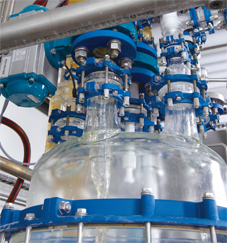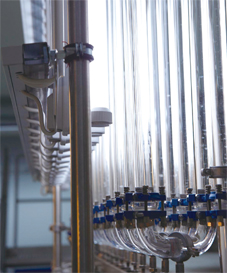
A customised biotech line allows quantities of helpful micro-organisms to be multiplied many times over and significantly improving their quality
SATURDAY is wash-day, for many drivers at least, in Europe. In summer and winter alike, there are long queues in front of the car wash facilities. In summer, the vehicles are often soiled with dust and organic dirt, which leads to odours forming in the service water, and in the winter contaminated with road salt as well. To combat the odours and to neutralise the road salt content of service water in car wash facilities, an environmental technology firm has developed innovative microbiological agents. inocre is a young company with just 17 permanent staff, but untold billions of busy little helpers. The German biotech pioneer, you see, breeds certain micro-organisms, modifies them to suit their future applications, propagates them, combines them with a suitable supply of nutrient, and offers them to businesses and private households for an enormous range of diverse applications. The firm produces bio-active, eco-friendly product groupings: ionic solutions featuring selected symbioses of micro-organisms, biopolymers and micro-nutrients which, depending on the application involved, are adapted to suit the particular local conditions and the customer's specific requirements. For this purpose, inocre has harnessed a team of researchers, specialists and highly qualified staff to put in place state-of- the-art production lines, including a lab for micro- and molecular biology and an in-house pilot plant and a new biotech line that Krones. The company purchases all its micro-organism strains from national collections, primarily from the DSMZ (Deutsche Sammlung von Mikroorganismen und Zellkulturen GmbH), an independent non-profit-making organisation. These pure cultures are tested in the firm's own laboratory for their metabolic activities, and then adapted to suit the target areas and target pollutants desired. In other words, the bacteria are made accustomed or compelled to accept particular pollutants as a source of food. This is done on a laboratory scale in 10-litre inoculum bottles, with the pure cultures produced under sterile conditions.  Up-scale process An up-scale process principle is used to propagate bacteria in which 300 litres are obtained from ten litres of product, and then 3000 litres. What are always involved here is prokaryotes, cellular creatures without a cell nucleus, which reproduce by fission and therefore each genetically identical to their forebears. First of all, a media autoclave prepares the sterile media, which are then passed directly to a glass fermenter holding 300 litres, where pre-fermentation takes place. Measuring parameters for the pre-fermenting function are temperature, pH, redox potential and conductivity. These data are communicated to the control system, and permit automated process control. Several glass columns located above provide an option for setting the fermentation temperature between 10º and 40º Celsius by appropriate heating or cooling, which renders the line very flexible in regard to disparate product groupings. The fermenter had to be made of glass, to cope with the corrosive conditions obtaining during fermentation. Aerobic, anoxic or anaerobic The media are then homogenised in two stainless steel stirring tanks holding 100 and 300 litres. For this purpose, agitators are installed and a re-circulation feature provided with 20-kilohertz ultrasonic treatment. This homogenisation function, too, can take place in a temperature range of 10º and 40º Celsius, with the same measuring parameters as in the pre-fermenter, and with heating and cooling effected here by warm or cold water in aAdidas
Up-scale process An up-scale process principle is used to propagate bacteria in which 300 litres are obtained from ten litres of product, and then 3000 litres. What are always involved here is prokaryotes, cellular creatures without a cell nucleus, which reproduce by fission and therefore each genetically identical to their forebears. First of all, a media autoclave prepares the sterile media, which are then passed directly to a glass fermenter holding 300 litres, where pre-fermentation takes place. Measuring parameters for the pre-fermenting function are temperature, pH, redox potential and conductivity. These data are communicated to the control system, and permit automated process control. Several glass columns located above provide an option for setting the fermentation temperature between 10º and 40º Celsius by appropriate heating or cooling, which renders the line very flexible in regard to disparate product groupings. The fermenter had to be made of glass, to cope with the corrosive conditions obtaining during fermentation. Aerobic, anoxic or anaerobic The media are then homogenised in two stainless steel stirring tanks holding 100 and 300 litres. For this purpose, agitators are installed and a re-circulation feature provided with 20-kilohertz ultrasonic treatment. This homogenisation function, too, can take place in a temperature range of 10º and 40º Celsius, with the same measuring parameters as in the pre-fermenter, and with heating and cooling effected here by warm or cold water in aAdidas
 iConnectHub
iConnectHub
 Login/Register
Login/Register Supplier Login
Supplier Login


























